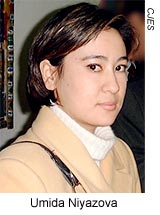New York, May 8, 2007—A Tashkent appellate panel set independent Uzbek journalist Umida Niyazova free from prison today, reducing the jail term handed down last week to a suspended sentence. The Committee to Protect Journalists welcomed Niyazova’s release but expressed concern at her standing conviction.
“We are relieved that our colleague Umida Niyazova is free and can be reunited with her family,” said CPJ Executive Director Joel Simon. “But we’re troubled that her conviction and baseless imprisonment has had a further chilling effect on what’s left of the Uzbek press.”
In an interview with the Uzbek service of Radio Free Europe/Radio Liberty, Niyazova thanked “all the people whom I know and don’t know who have defended me during this difficult time.” Initial news reports did not include an explanation from the appellate panel as to why it reduced the sentence.
Niyazova, first detained three and a half months ago, was convicted May 1 on charges related to her reporting on human rights and politics for a number of international news outlets. The trial court judge, Nizom Rustamov, had sentenced Niyazova to a seven-year prison term on charges of smuggling subversive literature, distributing with the use of foreign aid material that threatens national security, and illegally crossing the border with Kyrgyzstan, according to local press reports and Andrea Berg, Uzbekistan director for Human Rights Watch.
Niyazova was tried summarily, in the absence of reporters and diplomats who were banned from attending, and in the presence of very few independent observers, all of whom were forbidden to take notes during the trial, according to Berg who was in the courtroom. Niyazova’s lawyer, Tatyana Davydova, was given only 30 minutes to prepare her defense, and only one family member was allowed in the courtroom, according to CPJ sources in the region. Neither defense nor family was given prior notice of the court hearing.
The Niyazova case comes just days before the second anniversary of the killing of hundreds of civilians by government troops during civil unrest in the eastern city of Andijan. It also comes as the European Union is to begin talks on lifting limited sanctions imposed on Uzbekistan after the Andijan killings. The talks, scheduled for May 14, should take into account the appalling press freedom and human rights record of Uzbekistan, which remains Europe and Central Asia’s leading jailer of journalists, CPJ said today.
Before her jailing in January, Niyazova, 32, covered politics and human rights in Uzbekistan for the Central Asia news Web site Oasis, a project of the Moscow-based media watchdog Center for Journalism in Extreme Situations. She also contributed reporting to Freedom House and RFE/RL, and did translation work for Human Rights Watch and Internews Network.
